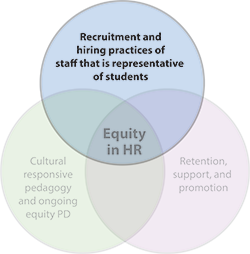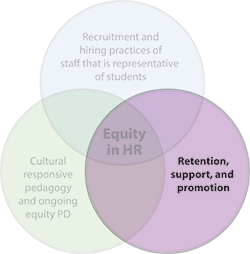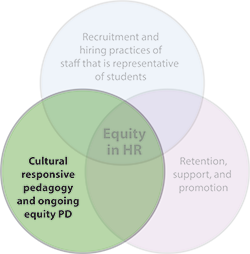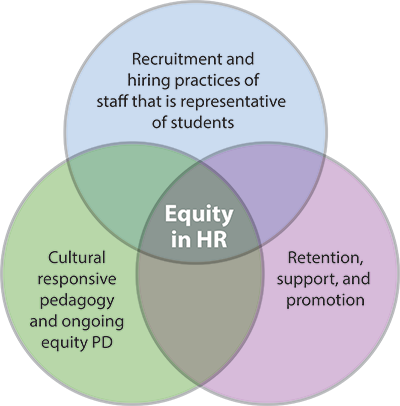Resources for Educators

Personnel & Staff Development Equity Resources
 Below you will find current research, promising practices, and useful resources to assist school districts in recruiting, hiring, supporting, and retaining staff members. MSAN districts work to hire educators who are culturally responsive, equity focused, and representative of their student body in terms of race, ethnicity, language, and other identity markers. The information listed below does not provide an exhaustive list of all personnel and staff development initiatives taking place across all of the MSAN districts. It DOES provide an abridged edition of the initiatives that are informing our shared work in this area, specifically in relationship to:
Below you will find current research, promising practices, and useful resources to assist school districts in recruiting, hiring, supporting, and retaining staff members. MSAN districts work to hire educators who are culturally responsive, equity focused, and representative of their student body in terms of race, ethnicity, language, and other identity markers. The information listed below does not provide an exhaustive list of all personnel and staff development initiatives taking place across all of the MSAN districts. It DOES provide an abridged edition of the initiatives that are informing our shared work in this area, specifically in relationship to:
- Recruitment and Hiring Practices of Staff that is Representative of Students;
- Retention, Support, and Promotion; and
- Culturally Responsive Pedagogy and On-Going Equity Professional Development.
Digging Deeper Equity Framework
- The Digging Deeper Equity Framework is a personnel and staff development reflection tool developed for MSAN by members of the Research Practitioner Council’s (RPC) Working Group on Personnel & Staff Development Equity Practices (2014-2016).
1) Recruitment & Hiring
 Qualities of an MSAN teacher
Qualities of an MSAN teacher
Take a look at two MSAN educators making a difference in the lives of their racially, ethnically, and linguistically diverse students. Closing the Culture Gap: When it comes to connecting with students, cultural sensitivity is more important than a common ethnic background.
Recruiting and hiring demographically representative and equity literate staff
Screening Tools
-
Several MSAN districts use their own screening tools and processes that align to their district mission and vision. One example of a platform that provides these tools is www.frontlineeducation.com/Solutions/Recruiting_Hiring.html
Interview Protocols
Several MSAN districts have piloted their own interview protocols that they believe target the specific knowledge, skills, and dispositions of equity literate educators.
- Chapel Hill-Carrboro City Schools (NC)
- Harrisonburg City Public Schools (VA)
- Evanston Township High School District (IL)
“Growing your own” diverse teachers
The following MSAN districts engage in some type of “Grow Your Own” initiative targeting the recruitment and hiring of demographically representative and equity-literate educators by supporting either high school students or currently employed support/classified staff:
- The Public Schools of Brookline (MA) – Today’s Students/Tomorrow’s Teachers
- Middleton-Cross Plains School District (WI), Sun Prairie Area School District (WI), Verona Area School District (WI), and Edgewood College – Growing Staff Diversity Collaboration
- Madison Metropolitan School District and University of Wisconsin-Madison – T.E.E.M. Scholars
- Educators Rising – A new national initiative of PDK International provides school districts and passionate young people with hands-on teaching experience, sustains their interest in the profession, and helps them cultivate the skills they need to be successful educators.
2) Retention, Support, and Promotion

The following is a sampling of recommended actions to retain, support and promote minority staff that are employed by some of our MSAN districts:
- Create minority staff affinity groups to support safe spaces to discuss the unique experiences, thoughts and feelings as members of our districts
- Host monthly dinners/activities for each affinity group to provide open spaces for conversation and place to sit and breathe
- Staff book club with text selections focused on race and equity
- Support self-organized Minority caucus groups to impact policy and district procedures
- Require the inclusion of both internal and external minority candidates whenever possible, as well as including people of color on the hiring team, each time there is a vacancy in our districts.
 3) Culturally Responsive Pedagogy and Ongoing Equity Professional Development
3) Culturally Responsive Pedagogy and Ongoing Equity Professional Development
The following represents a brief glimpse of the materials currently used across MSAN districts for continuous professional development in the area equity/social justice. Our individual and collective experiences support us in our position that PD around equity/social justice and culturally responsive practices needs to be embedded into an organized structure at the district level. It should be ongoing and constant. It also needs to be required, not optional.
Current Research on Personnel & Staff Development Equity Practices
- Hanover Research, a research and grant development firm that several MSAN districts have partnered with, produced a review of research on Recruiting and Retaining Diverse Personnel (2014) that has informed our shared work. Hanover Research is a global information services firm that provides market research, institutional analysis, and grant proposal development to K-12 organizations as well as colleges, universities, healthcare organizations, and other non-profits. MSAN districts who partner with Hanover Research include: Farmington Public Schools (MI), Madison Metropolitan School District (WI), Chapel Hill-Carrboro City Schools (NC), Mesa Public Schools (AZ), and Cleveland Heights-University Heights City School District.
- NEA and Teacher Recruitment: An Overview. Retrieved March 2, 2016 from the National Educational Association website: http://www.nea.org/home/29031.htm
- Metropolitan Policy Program at the Brookings Institute. (2010). State of Metropolitan America: On the Frontlines of Demographic Transformation. Retrieved from http://www.brookings.edu/~/media/research/files/reports/2010/5/09%20metro%20america/metro_america_report.pdf
- Ingersoll, R. & May, H. (September 2011). The Minority Teacher Shortage: Fact of Fable? Kappan Magazine, volume 93 (1). Retrieved from http://www.gse.upenn.edu/pdf/rmi/Fact_or_Fable.pdf
- American Progress. (November 2011). Increasing Teacher Diversity: Strategies to Improve the Teacher Workforce. Retrieved from https://cdn.americanprogress.org/wp-content/uploads/issues/2011/11/pdf/chait_diversity.pdf
THANK YOU to all RPC members who contributed to the Working Group on Personnel & Staff Development Equity Practices (2014-2016)
Angela Allen, The Public Schools of Brookline (MA)
Jennifer Apodaca, Sun Prairie Area School District (WI)
Pete Bavis, Evanston Township High School District 202 (IL)
Laura Brown, Federal Way Public Schools (MA)
Percy Brown, Middleton-Cross Plains Area School District (WI)
Laurie Burgos, Verona Area School District (WI)
Julie Crawford, Alexandria City Public Schools (VA)
Victor Diaz, Isaac Elementary School District #5 (AZ)
Jonathan Ellwanger, Oak Park Elementary District #97 (IL)
Naomi Khalil, Farmington Public Schools (MI)
Patrick Lintner, Harrisonburg City Public Schools (VA)
Laura Love, Middleton-Cross Plains Area School District (WI)
Gabriel McCormick, The Public Schools of Brookline (MA)
Octavia Reid, Cleveland Heights-University Heights City School District (OH)
Chris Rossini, Paradise Valley Unified School District (AZ)
Felicia Starks-Turner, Oak Park Elementary District #97 (IL)
Rodney Thomas, Madison Metropolitan School District (WI)









